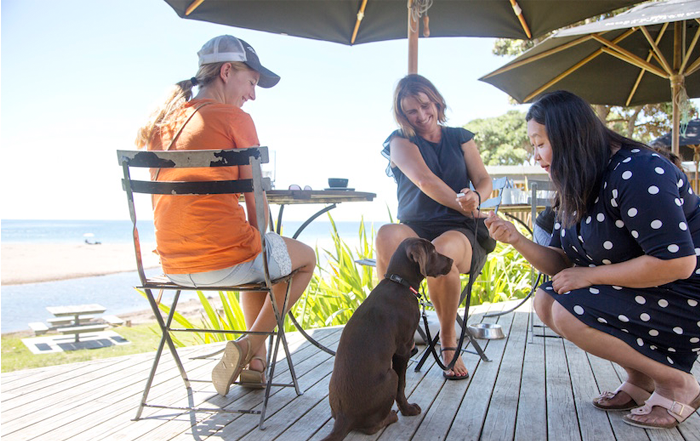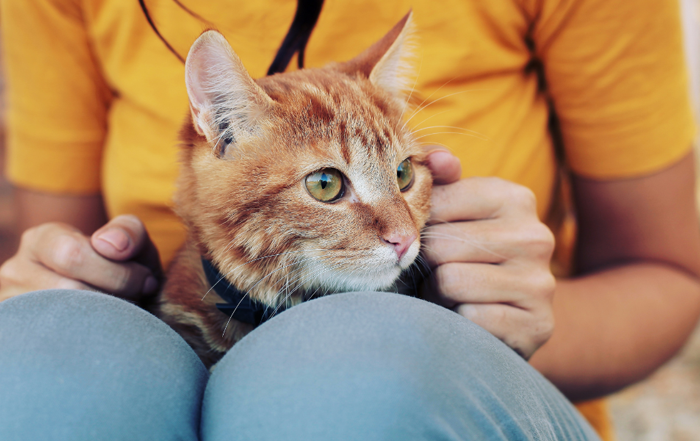Pets add a huge amount of value to our lives, contributing to our physical, emotional and mental wellbeing! Much research has demonstrated this fact and it’s very reassuring.
Having a pet can reduce stress, increase levels of all the feel good hormones, lower blood pressure and cholesterol, protect against cognitive decline, encourage more physical activity, and strengthen the immune system. Pets offer unconditional love and companionship, they’re a source of comfort, empathy and stability.
But if you’re reading this article, I probably don’t need to sell you on the benefits of having a furry friend in your life now do I?
However…choosing the right pet for your lifestyle is essential if you want your life together to go smoothly. Too often the issues I see at my Behaviour Clinic relate to a simple mismatch between a pet and their owner from the start, and all of a sudden those benefits are reversed, leaving stress, shame, guilt and even physical injury in their place.
I’m here to guide you through those considerations to make sure your life with your pet is as relaxed and joyful as it should be!

Mark Vette is a world-renowned Animal Behaviourist, Zoologist and Trainer. He brings together a unique combination of academic studies with 40 years of applied clinical animal behaviour consulting and treatment. Mark is a member of the International Association of Animal Behaviour Consultants. This article was written by Mark and the views expressed are his own.
First - what species of pet will suit you best?
Though there is an abundance of choice when it comes to pets - from dogs to frogs, rabbits to reptiles - for the purpose of this article, I’ll hone in on New Zealand’s most popular choices; dogs and cats. There is a sliding scale of low to high maintenance with dogs being the most high maintenance and the self contained tank dwellers like fish or reptiles being much lower down the scale. So if you’re looking for something that doesn’t require too much from you, look into tank pets!
When it comes to dogs versus cats, they share many common traits. Both offer the numerous benefits I listed above, both are warm and furry, both generally love to engage with their humans and provide excellent companionship.
Every type of pet has pros and cons!
Here’s a brief list of some of the pros and cons of these two choices.

DOG - Pros:
- Are social pack animals that naturally enjoy contact with people, other dogs and other species
- Have evolved to instinctively connect very well with humans
- Great if you enjoy contact, cuddles and companionship
- Provide unconditional love
- Encourage you to be more physically active
- Can help facilitate other human interactions
- Will enjoy accompanying you to lots of places such as parks, cafés, beaches and friend’s places
- Can partake in hobbies with you such as tramping, walking and agility and much more
- Can be trained to support and care for people in need or with disabilities e.g guide dogs etc.
- An enormous range of breeds with differing qualities gives an opportunity to choose qualities that best align with you and your life
DOG - Cons:
- Have high needs including daily exercise, enrichment and stimulation (to varying degrees based on breed and age)
- If behavioural issues occur, they can be very serious and have a large impact on your life
- Can be dangerous if not socialised and trained properly
- Require a much higher level of time investment as puppies for their training
- Shouldn’t be left alone for long periods of time
- Need a lot of attention
- Can cause allergic responses
- Expensive to own on an ongoing basis (food, insurance, vaccines, toys etc)
- Need kenneling when you go away

CAT - Pros:
- Are smaller and can be cared for with much less effort compared with dogs - they need less food, don’t need walking and usually don’t need grooming
- Don’t require anywhere near the same level of training as dogs
- Are also excellent for comfort, companionship and social contact
- Connect well with humans though tend to be more independent
- Very clean!
- Though they still enjoy dedicated play time and engagement, their need for this mental stimulation is less than for a dog
- Can be left alone for longer than a dog
CAT - Cons:
- Can be prone to hunting, not ideal if you live somewhere with a lot of native birds
- Can cause allergic responses
- Can develop problematic behaviours such as scratching furniture, biting or spraying inside
- Can’t take them as many places as dogs, as most don’t enjoy leaving their territory, crate travel and being out and about in public (though there are exceptions of course, and you can train them to do so if you travel them early and harness train them)
- Normally less expensive to own than a dog, however they still do require costs on an ongoing basis (food, insurance, vaccines, toys etc)
- Not so easily left at other peoples’ homes, usually require cattery care or an in home pet sitter if you're going away
Important consideration
If considering a dog versus cat, also factor in your living arrangements. If renting, you’ll need to consult your landlord about getting a pet first, often a cat is more easily accepted for rentals than a dog, so that might factor into your decision. Also think about your plan for your pet if you ever need to move - finding a rental is unfortunately more challenging with a pet, so it’s good to have a temporary back up option in case that happens and it takes a while to find new pet-friendly accommodation. If you’re planning to move overseas at some stage, will you take your pet with you? It’s my strong belief that when you adopt a pet, it should be for life.
How to choose the right breed for you
Once you’ve landed on a species, you still need to establish what breed is the best fit for your lifestyle. With dogs in particular, there is a HUGE variation between breeds and the resulting temperament and requirements.
Some breeds will need hours of daily exercise, high level mental stimulation and ongoing training work. Others will be much more relaxed and docile, happy as a companion dog spending a lot of time in quiet contact with you.
Some breeds will be more challenging to train and socialise, others will be fairly forgiving in that regard.
Some will cope easily with children and unexpected situations, others will be more sensitive.
Some will be more prone to predatory behaviours and chasing other animals, others will not have strong hunting instincts.
Some will be easy to recall and walk off lead, some will have such strong instincts as to make that almost impossible.
With hundreds of different breeds and thousands of cross breeds and lines of breeds, I’ll save the exploration into that for another article. But if getting a dog, be sure to do LOTS of research into the qualities of the breed you’re considering. Don’t make the mistake of choosing on “cuteness” alone!
Similarly with cats, some breeds will be much more docile and affectionate, others more independent or inclined to hunt, chase and play.
Fortunately, we’re blessed with Google so each of us can easily research the qualities of a breed we’re interested in. Just a word of advice, be sure to actively search for “cons of breed” as I find many websites only give the positive side of the story without warning you of the challenging aspects of a given breed. You want to ensure you have the full picture before you make a choice.
Mixed breed vs pure bred
Mixed breeds are often a good choice, as they benefit from hybrid vigour and can be more healthy, robust and inherit positive traits from each side. If you are choosing a pure bred dog, find an excellent breeder to avoid breed specific ailments (some breeds are prone to various congenital, medical and psychological problems such as cleft palate, blindness, hip dysplasia, fearfulness and deafness). It might be beneficial to search online for any health-related issue relevant to the breed(s) you’re interested in.
Adopt or shop? And how to choose a good breeder
Where possible, I support adoption from a rescue shelter – there are thousands of pets desperately looking for loving homes!
If you do get a rescue, work with the shelter to choose carefully particularly with dogs. Make sure you check the dog is sociable and not too fearful, as this could create issues.
If opting to purchase a dog in order to get particular breed qualities you're after, here are my suggestions:
- Don’t buy from puppy farms. Visit the facility and look carefully at how the parent dogs and puppies are kept and raised. It should be clean and allow the puppies to socialise with people, other dogs and other animals. The puppies should not be kept full time in a highly restrictive environment. Ideally they have contact with the family and in the home.
- Be very wary of any breeder that will not allow you to visit their facility.
- Ask to meet the pup’s parents, be wary if the parent dogs have health or behavioural issues or have required correctional surgery. The temperament of the parent dogs is well worth exploring.
- Choose a breeder that is registered with Dogs New Zealand.
- Avoid breeders who produce puppies with really exaggerated features, as this can compromise welfare. If choosing a breed that does have exaggerated features, find a breeder who is actively trying to breed away from these extreme features.
- Responsible breeders have their pups vet checked before they go to new homes to screen for potential health issues.
- Ideally, breeders will have started their puppies’ training and socialisation before they come home with you.
- Be careful of taking a pup or dog older than 8 weeks from a breeder if they have lived in a breeding kennel rather than in their home. They won’t adapt to home living any where near as well.
Age
Finally, I want to briefly touch on age. If you get a pet while they are very young, you have the opportunity to shape their temperament and behaviour for life. This is particularly important with dogs, as a dog with behavioural issues can be a danger to themselves, you or others.
So with dogs in particular, if you’re an inexperienced trainer I would suggest getting a puppy at 8 weeks old. This is the beginning of the critical formative period and is the most important time in their development (80% of the brain wires up in the 2 to 4 month period). Getting one at this age means you’re in control of the key training and socialisation needed to ensure a well balanced dog. If you’re an experienced owner, you can opt for an older dog who may need a bit of “un-training” as well as training!
If you adopt a kitten, you can give them lots of early human contact and handling which is more likely to result in an affectionate, human-oriented cat. However this is less critical, as long as a cat has had good human contact, it’s fine to adopt them at a later age.
Be patient in the process
A pet can become a huge part of your life for many years, so take the time to do your research and make sure you choose the option that’s best for you and your lifestyle. It’ll be so worth it!
Always consult your vet on the best way to look after your pet. And to avoid unexpected costs, make sure your pet is insured.
Have a look at our pet insurance plans to choose the right insurance plan for your pet.
